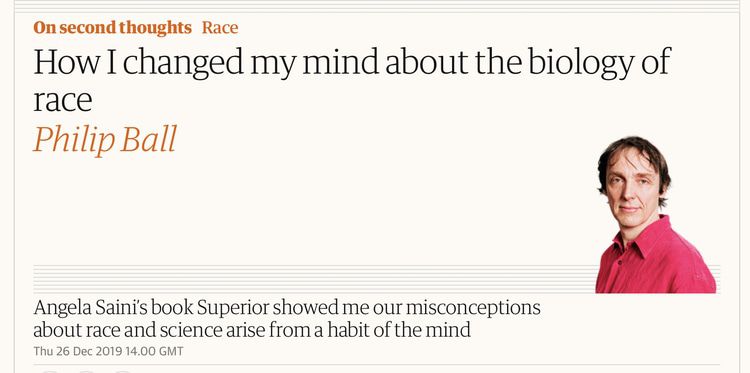
By Steve Sailer
12/28/2019
From The Guardian:
How I changed my mind about the biology of race
Philip Ball
Angela Saini’s book Superior showed me our misconceptions about race and science arise from a habit of the mindThu 26 Dec 2019
It has been common for several years now to assert that science shows the concept of race has no biological basis, and that we must see it instead as a social construct. That case was argued, for example, by Kenan Malik in his 2008 book Strange Fruit, and it is presented, too, in Angela Saini’s Superior (which I reviewed for the Guardian in July), a popular choice on many “books of the year” lists.
I used to be sceptical about this claim. I have all the liberal lefty’s revulsion at racism, but I couldn’t help thinking: “If we insist that race is not biologically determined, won’t that just confuse people, given that it is so blindingly obvious that characteristic markers of race are inherited?” The usual argument is that genomics has identified no clusters of gene variants specific to conventional racial groupings: there is more genetic variation within such groups than between them. But doesn’t that insist on a definition of race that most people simply won’t recognise? Isn’t it better to say that yes, race has a biological basis — but the relevant bodily features are a trivial part of what makes us us?
I confess that I was too nervous to make this suggestion in such an incendiary area. Fortunately, after reading Saini’s book I no longer need to, for Superior gave me the perspective I needed to see what is wrong with it. Our concept of race is not really about skin colour or eye shape, and never has been. It has baked into it beliefs that can’t be dispelled merely by reducing its biological correlates to trivialities. For in our assumptions about race, those features have always been rather irrelevant in themselves. Rather, they serve to activate prejudices stemming from deeply ingrained cognitive habits.
Saini shows that what we have understood by race encodes the belief that literally superficial aspects of our appearance act as markers for innate differences we can’t see. And here’s the problem: it does so for good reason. In times past, and sometimes still today, the strong correlation between your appearance and your culture meant that visual differences really could act as proxies for certain differences in attitudes, traditions and beliefs.
Our brains are exquisitely adapted to pick up on such correlations — and, unfortunately in this case, to conclude that they are causative. We instinctively assume that differences in behaviour that are in fact due to culture must be linked to — even caused by — characteristics of appearance. That is what the traditional notion of race is all about.
No, actually, the traditional notion of race is that it’s about genealogy, about who your ancestors were, which appearance give us clues toward estimating. As Darwin wrote to Huxley in 1857:
I knew, of course, of the Cuvierian view of Classification, but I think that most naturalists look for something further, & search for “the natural system, for the plan on which the Creator has worked, etc etc. It is this further element which I believe to be simply genealogical. … Grant all races of man descended from one race; grant that all structure [i.e., physical features] of each race of man were perfectly known–grant that a perfect table of descent of each race was perfectly known–grant all this, & then do you not think that most would prefer as the best classification, a genealogical one?
Understanding genealogy gives us in turn clues about nature and nurture: if we can guesstimate who your ancestors were, we can guesstimate something about your genes and your upbringing. Obviously, this is all highly approximate and there are many exceptions, but that’s what this is all about.
Of course, disentangling the effects of nature and nurture remains intellectually challenging, which is why we use such sophisticated mechanisms as twin and adoption studies, as well as advanced genomics. Nature vs. Nurture is the big leagues of the human sciences.
But genetics has found no such innate origins of behavioural differences between “races” — and it is highly unlikely, given what we know about genetic variation, that it would.
Uh, no …
For example, people from Asia are much more likely to be lactose-intolerant than people of European heritage. But what our brains find so hard to process is that no one is lactose-intolerant because they are Chinese.
The Chinese adult is lactose-intolerant because he had Chinese parents who were lactose-intolerant. Even if he were adopted and raised in milk-drinking obsessed Denmark, he would still be lactose-intolerant because of who his parents were and the genes they gave him.
This is a content archive of VDARE.com, which Letitia James forced off of the Internet using lawfare.